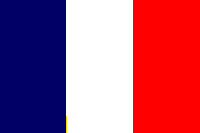Guyane
| Conventional short name: | |
| Local: | Guyane française |
| English: | French Guiana |

| |
| National motto: Liberté, égalité, fraternité | |
| Subdivision of: | France |
| Languages: | |
| Official: | French |
| Others: | Acehnese, Amazigh (Berber), Arabic (Levantine, Darija), Arawakan (Arawak, Palikur), Bengali, Carib (Kalina and Wayana), Chinese (Cantonese, Hakka, Wu), Dutch, French creoles (Antillean, Guyanese, Haitian, Karipúna, Tây Bồi Pidgin), Fulani, Gujarati, Khmer, Mandinka, Portuguese, Tamil, Tupi-Guaraní (Teko and Wayampi), Susu, Vietnamese |
| Cities: | |
| Capital: | Cayenne |
| Other: | not many |
| President: | Emmanuel Caron |
| Prime Minister: | Philippe Edouard |
| President of the Assembly: | Liêm Hoang-Ngoc |
| Area: | 83,534 km2 |
| Population: | 436,038 (581,384 including refugees) French Guyanese, Guianan; Guyanais/Guyanaise |
| Currency: | 1 Livre=20 sous=240 deniers |
| Organizations: | Union de Pays Francophones, European Federation |
In the mid-17th century the French had established a presence in the northern coast of South America after displacing most of the original Carib and Arawak Indian inhabitants. In 1761, Chevalier Étienne-François Turgot, Lord of Brucourt and Marquis of Soumont, established a Hospitaller colony using Maltese labor to clear the hostile wilderness and settle the rainforest. By 1765, the French had consolidated their position with the Batavian Republic and Federated Kingdoms as controllers of the region, and began to export sugar and rainforest timber as economic mainstays. Though this lasted for a time, with the abolition of slavery the economy collapsed and the colony wasted.
It was near this time that a penal colony was established in Guyana to attempt to reduce the costs of prisons in France, and also to build up the failing colony. A grand total of some 70,000 prisoners - including Alfred Dreyfus and Henri 'Papillon' Charrière - were shipped there in the period of 1852 - 1939. Those who managed to survive in the jungle climate were then forced to remain as exiles for an equal period of time, although malaria made the population growth negligible, with 90% of the prisoners dying.
Guyana remained a penal colony until after GWII, becoming a French department in 1946.
Borders
North and East: Atlantic Ocean.
West: Batavian Guyana.
South: Equador.
| |||
|---|---|---|---|
| Communities | |||
| Francie | Gaullhe | DOM | Algeria* | | |||
| Départements | |||
| Ain | Aisne | Álava | Allier | Alpes-de-Haute-Provence | Alpes-Maritimes | Ante-Pyrenee | Ardèche | Ardennes | Ariège | Aube | Aude | Austro-Antartica | Aveyron | Bouches-du-Rhône | Calvados | Cantabria | Cantal | Charente | Charente-Maritime | Cher | Corrèye | Corse-du-Sud | Côte-d'Or | Côtes-d'Armor | Creuse | Deux-Sèvres | Dordogne | Doubs | Drôme | Essonne | Eure | Eure-et-Loir | Finistère | Gard | Gers | Gironde | Guipúzcoa | Hainaut | Haute-Corse | Haute-Garonne | Haute-Loire | Haute-Marne | Hautes-Alpes | Haute-Saône | Haute-Savoie | Hautes-Pyrénées | Haute-Vienne | Hauts-de-Seine | Hérault | Ille-et-Vilaine | Indre | Indre-et-Loire | Isère | Jura | Landes | Liege | Loire | Loire-Atlantique | Loiret | Loir-et-Cher | Lot | Lot-et-Garonne | Lozère | Maine-et-Loire | Manche | Marne | Martinique | Mayenne | Mayotte | Meurthe-et-Moselle | Meuse | Morbihan | Moselle | Namur | New-Caledonia | Nièvre | Nord | Oise | Orne | Paris | Pas-de-Calais | Puy-de-Dôme | Pyrénées-Atlantiques | Pyrénées-Orientales | Réunion | Rhône | Saint-Pierre-et-Miquelon | Saône-et-Loire | Sarthe | Savoie | Seine-et-Marne | Seine-Maritime | Seine-Saint-Denis | Somme | Tarn | Tarn-et-Garonne | Territoire-de-Belfort | Val-de-Marne | Val-d'Oise | Var | Vaucluse | Vendée | Vienne | Vizcaya | Vosges | Wallis-et-Futuna | Walloon Brabant | Yonne | Yvelines | |||
| Départements d'Outre-Mer | |||
| French Guyana | Guinée | Guadeloupe | Mélanasie Français | Nouvelle Calédonie | Polynesie Français | Vanuatu | |||